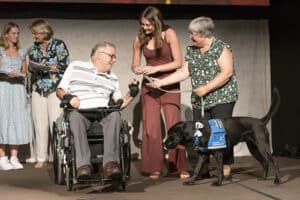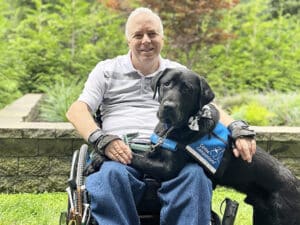Seaford, Delaware
By Carson Williamson – Seaford Morning Star
Fetch, roll over, shake, speak. For many dogs, these are the commands they follow and utilize in their day-to-day lives with their owners, or what their owners hope to train them for some day. For some dogs, however, there’s far more they are capable of. Such is the case of Radcliff, the service dog of southern Delaware native Brian Bard, who has helped Bard in his everyday life as both a companion and an assistant.

Brian Bard of Seaford was recently matched with Canine Companions service dog Radcliff, a two year old lab-golden retriever cross specially bred and trained by Canine Companions to help Brian with his disabilities.
Bard serves as a program manager for the National Institute on Disability, Independence Living, and Rehabilitation Research, and manages a number of research programs for the Department of Health and Human Services, including the Spinal Cord Injury Model System (SCIMS), and the Small Business Innovation Research (SBIR). Where Radcliff plays into all of this, however, come from one key detail about Bard; Bard is a quadriplegic, who has used three separate service dogs including Radcliff for the purpose of assisting him in his everyday life.
Bard explained that after his last service dog retired of old age, he originally didn’t go for a third service dog immediately, so he has only been working with Radcliff since August. “It was always something I wanted, but working for a living got in the way,” Bard said. “I went to work in D.C., so that was a hundred and two miles each way, and even without the commute I was working 10 hours a day,” Bard mentioned, “I didn’t want to do that to the dog.”
Once Bard began teleworking , he put in for this third service dog since he wasn’t around as many people anymore. Radcliff’s main duties include picking things up for Brian and being a comforting presence. “He’s real chill, he’s a very mellow dog.” Bard said, “He’s happy to be with me and he’s happy to work.”
Radcliff isn’t the only service dog to provide support for Bard however.
Bard recalled an experience from his youth at the University of South Florida, explaining that he entered the room in his wheelchair as a quadriplegic and began receiving a number of looks. “Whether they wanted to or not,” Bard explained. “When I got a service dog, it changed completely. Having a beautiful service dog by your side diverts attention to the dog., they’re not even looking at the dude in the wheelchair.”
Bard admitted that he loved it, and that it’s an intrinsic value of having a service dog. Another value Bard mentioned was that just being able to put his hand out and pet his dog would make him feel good and take care of any anxious feelings he had. “The don’t train these dogs to be guard dogs at all, in any way, but just having a big dog next to you helps you feel safe.”

Canine Companions have served over 7,000 individuals of varying disabilities and needs.
Bard also mentioned that having a service dog encourages him to get out more, and that people often find it easier to approach him in order to ask if he requires help, which he greatly appreciates. Being more approachable; however, does come with its own risks for a service dog. Bard stressed that it’s important for people not to whistle or call out to and otherwise try to gain the attention of a service dog, as it distracts the dog from their owner and any assistance they may need.
None of these things would be possible for Bard without the trainers of Radcliff and his previous two service dogs, Canine Companions. Canine Companions, a non-profit organization that trains and provides service dogs for no charge, has served over 7,000 individuals of varying disabilities and needs. Bard gave some insight into the process that Canine Companions utilized when it came to helping him, and many others, find a dog that worked well with them. “There are breeders who keep the dogs while they’re very young puppies, “Bard explained. “And then they’re sent to puppy raisers, who keep the dogs for a year and a half.” During this time the dogs are taken to periodic training classes to help with socialization and basic commands. “After their puppy raiser is done, they go into official training, “Bard said. “They go to a Canine Companions facility and they go in for approximately six months of training where they live in the kennel, and learn all the higher-level commands.” Bard then explained that when the dogs are ready, they bring owners in to interact with the dogs for two weeks until a match is found between dog and owner.
If you’d like to know more about Canine Companions, or are interested in helping a person with disabilities in your life with acquiring a service dog, you can utilize their website at canine.org, or call them at 1-800-572-BARK (2275).

